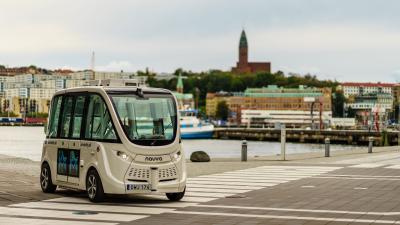Globally, nearly two thirds of people would not feel safe in self-driving cars
This page is approximately a 3 minute read
This page was published on

The 2021 World Risk Poll reveals that worldwide, 65% of people say they would not feel safe being driven in a car without a human driver. Just 27% of people globally say they would feel safe, and in no country or region did more than 45% of people say they would feel safe.
Technology companies and auto manufacturers have predicted the widespread adoption of automated driving systems for years1, however the Poll data shows that buy-in to autonomous vehicles continues to face challenges, as people still have concerns about safety.
The Poll also found that globally, people’s fear of road crashes correlates with their appetite for self-driving cars. Of those who are very worried about harm from traffic or roadside collisions, only 24% said they will feel safe in a car driven by a computer. Whereas, for those who aren’t worried about road crashes generally, the figure rises to 30%. Concern about road crashes was highlighted in the first 2021 World Risk Poll report – A Changed World? Perceptions and experiences of risk in the Covid age – which found that 13% of people worldwide named road related crashes and collisions as the biggest day-to-day risk to their safety.
A Digital World: Perceptions of risk from AI and misuse of personal data
Read the reportConfidence in self-driving cars by region
The Poll data shows that while trust in self-driving cars varies substantially around the world, more people in every country surveyed say they would not feel safe in a self-driving car than said they would feel safe. Denmark has the highest percentage of people who would feel safe (45%), followed by UAE (44%), Afghanistan (44%), Italy (43%), Spain (41%), Kyrgyzstan (41%), and Sweden (40%).
While Afghanistan is amongst the countries where people are most likely to feel safe, it also shows one of the largest gender gaps in the world on this question, with 54% of Afghan men saying they would feel safe, versus 34% of women. The difference likely reflects restrictions that prevent many Afghan women from driving alone2.
- 2
Bellingreri, M., & Mamo, A. (2019, August 22). Kabul: ‘I want to break the tradition that women can’t drive.’ Aljazeera.
Dr. Sarah Cumbers Former Director of Evidence and Insight, Lloyd’s Register Foundation
It’s clear there is low confidence in self-driving vehicles globally. As automotive companies develop these vehicles, it's vital that safety regulation keeps pace so people across the world can engage with these technologies – and reap their benefits – with greater confidence. That’s why Lloyd’s Register Foundation supports programmes such as the Assuring Autonomy International Programme that work to ensure the safe introduction of autonomous systems, including self-driving cars.

Education plays a role in confidence
People with higher levels of education are most likely to say they would feel safe in a self-driving car. Overall, 35% of those with post-secondary education responded this way, versus 28% of those with secondary education, and 25% with primary education or less.
However, internet access is also independently associated with feeling safe; amongst people at each educational attainment level, the percentage who say they would feel safe is at least nine percentage points higher among those with internet access than amongst those without it. For people with secondary education or with primary education or less, the gap is 10 percentage points.
These findings suggest internet access may play a key role in increasing people’s level of comfort with emerging technologies like self-driving cars. Internet use provides exposure to digital technologies and requires people to achieve some level of digital literacy, regardless of their formal education level. This may have important implications for policymakers seeking to promote public acceptance of AI and AI-driven advances as internet access and use continue to spread to more of the world’s population.
How safe people would feel in a self-driving car, by country.
Suppose that in the next few years we have cars that can drive themselves using a computer system in the car, without a
human driving them. Would you feel safe being driven in a car without a human driver, or not?
Download the report

A Digital World: Perceptions of risk from AI and misuse of personal data
This report discusses the use of autonomous technologies, such as self-driving cars and reveal insights into how much people trust organisations. (PDF, 4.02MB)
